Annotated Bibliography: Exploring Business Graduate Employability
VerifiedAdded on 2022/08/08
|6
|1451
|21
Annotated Bibliography
AI Summary
This annotated bibliography compiles and analyzes five key articles related to business graduate employability. The selected sources delve into various facets of the topic, including the skills gap between business graduates and employer expectations, student perspectives on employability development, the impact of work experience characteristics (duration, type, and location), the role of action learning in enhancing employability, and the cultural factors influencing workplace skills. The articles highlight the need for business schools to better integrate practical skills development, the importance of understanding student perspectives, and the significance of work experience in enhancing employability. The bibliography also emphasizes the influence of stakeholders (employers, educators, and students) on the employability of business graduates. Furthermore, the research stresses the importance of considering the broader contextual and cultural factors that shape student success in the workplace.
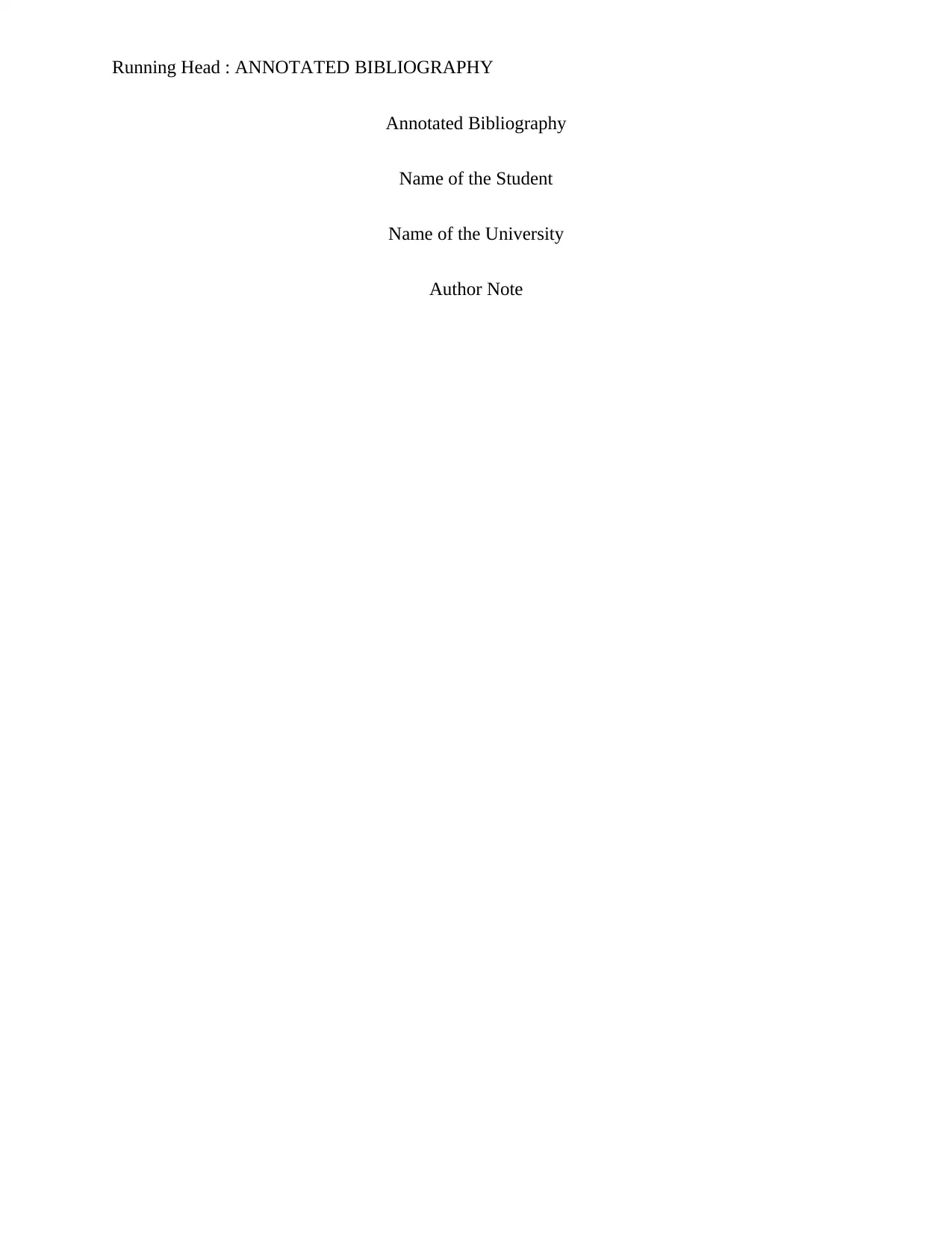
Running Head : ANNOTATED BIBLIOGRAPHY
Annotated Bibliography
Name of the Student
Name of the University
Author Note
Annotated Bibliography
Name of the Student
Name of the University
Author Note
Paraphrase This Document
Need a fresh take? Get an instant paraphrase of this document with our AI Paraphraser
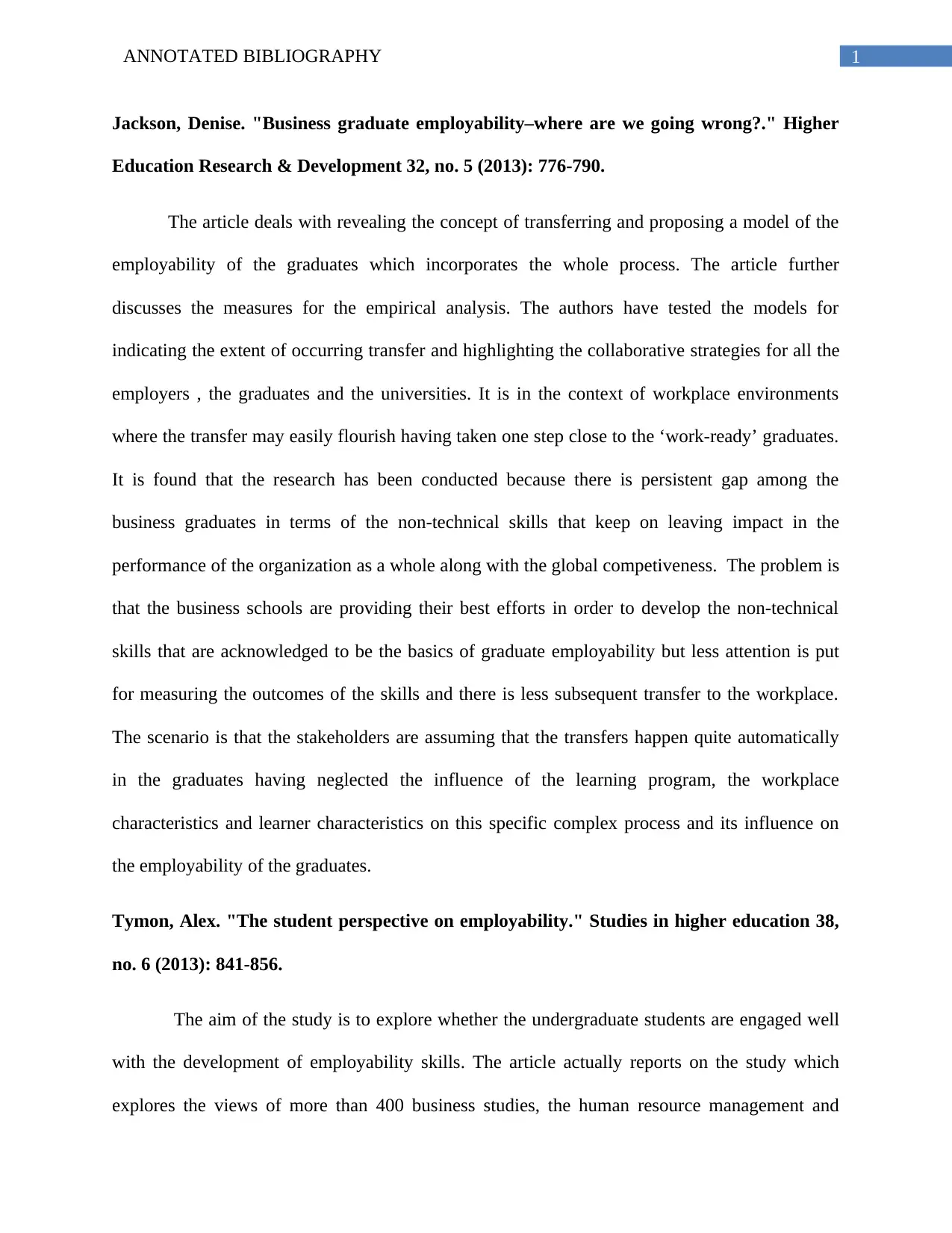
1ANNOTATED BIBLIOGRAPHY
Jackson, Denise. "Business graduate employability–where are we going wrong?." Higher
Education Research & Development 32, no. 5 (2013): 776-790.
The article deals with revealing the concept of transferring and proposing a model of the
employability of the graduates which incorporates the whole process. The article further
discusses the measures for the empirical analysis. The authors have tested the models for
indicating the extent of occurring transfer and highlighting the collaborative strategies for all the
employers , the graduates and the universities. It is in the context of workplace environments
where the transfer may easily flourish having taken one step close to the ‘work-ready’ graduates.
It is found that the research has been conducted because there is persistent gap among the
business graduates in terms of the non-technical skills that keep on leaving impact in the
performance of the organization as a whole along with the global competiveness. The problem is
that the business schools are providing their best efforts in order to develop the non-technical
skills that are acknowledged to be the basics of graduate employability but less attention is put
for measuring the outcomes of the skills and there is less subsequent transfer to the workplace.
The scenario is that the stakeholders are assuming that the transfers happen quite automatically
in the graduates having neglected the influence of the learning program, the workplace
characteristics and learner characteristics on this specific complex process and its influence on
the employability of the graduates.
Tymon, Alex. "The student perspective on employability." Studies in higher education 38,
no. 6 (2013): 841-856.
The aim of the study is to explore whether the undergraduate students are engaged well
with the development of employability skills. The article actually reports on the study which
explores the views of more than 400 business studies, the human resource management and
Jackson, Denise. "Business graduate employability–where are we going wrong?." Higher
Education Research & Development 32, no. 5 (2013): 776-790.
The article deals with revealing the concept of transferring and proposing a model of the
employability of the graduates which incorporates the whole process. The article further
discusses the measures for the empirical analysis. The authors have tested the models for
indicating the extent of occurring transfer and highlighting the collaborative strategies for all the
employers , the graduates and the universities. It is in the context of workplace environments
where the transfer may easily flourish having taken one step close to the ‘work-ready’ graduates.
It is found that the research has been conducted because there is persistent gap among the
business graduates in terms of the non-technical skills that keep on leaving impact in the
performance of the organization as a whole along with the global competiveness. The problem is
that the business schools are providing their best efforts in order to develop the non-technical
skills that are acknowledged to be the basics of graduate employability but less attention is put
for measuring the outcomes of the skills and there is less subsequent transfer to the workplace.
The scenario is that the stakeholders are assuming that the transfers happen quite automatically
in the graduates having neglected the influence of the learning program, the workplace
characteristics and learner characteristics on this specific complex process and its influence on
the employability of the graduates.
Tymon, Alex. "The student perspective on employability." Studies in higher education 38,
no. 6 (2013): 841-856.
The aim of the study is to explore whether the undergraduate students are engaged well
with the development of employability skills. The article actually reports on the study which
explores the views of more than 400 business studies, the human resource management and
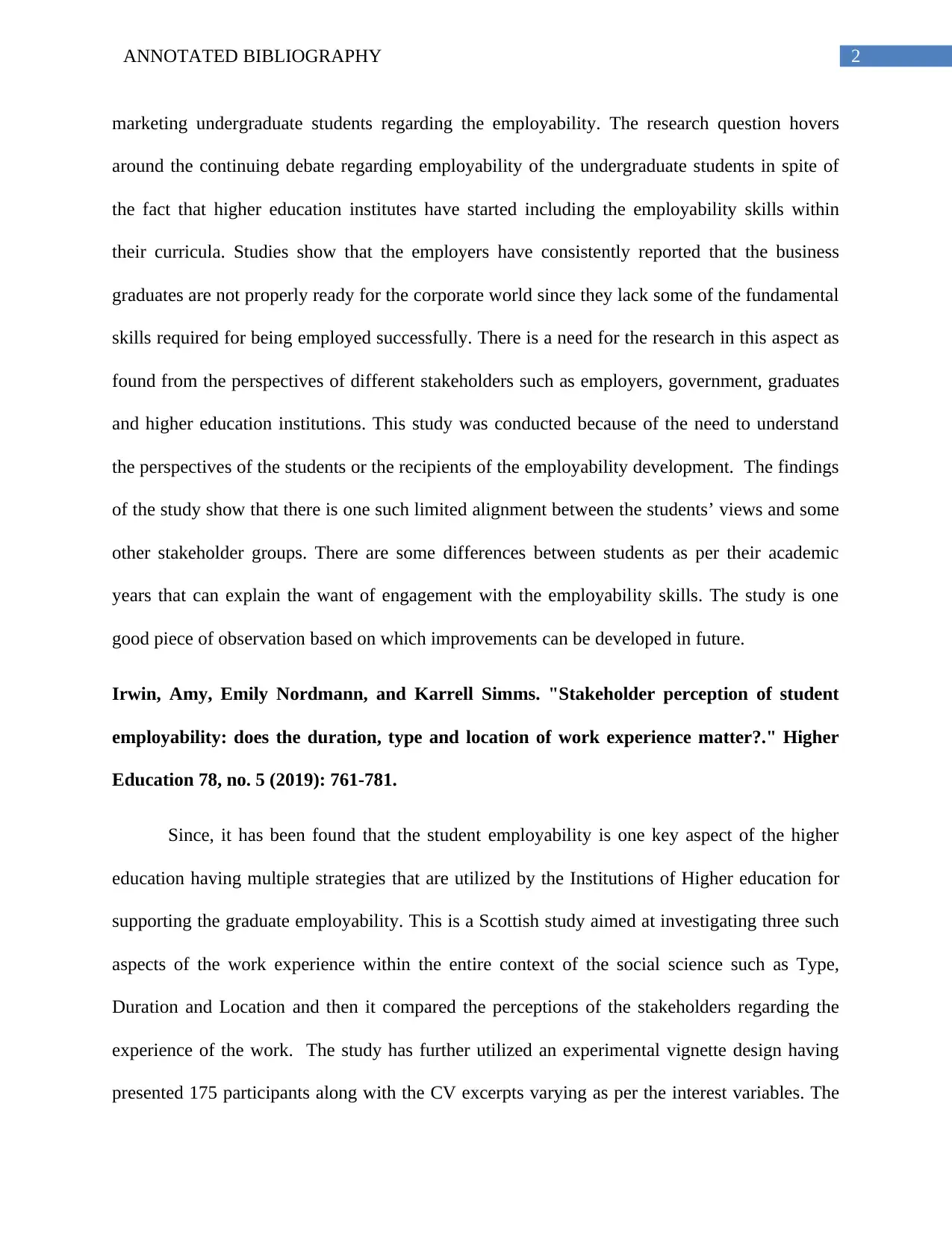
2ANNOTATED BIBLIOGRAPHY
marketing undergraduate students regarding the employability. The research question hovers
around the continuing debate regarding employability of the undergraduate students in spite of
the fact that higher education institutes have started including the employability skills within
their curricula. Studies show that the employers have consistently reported that the business
graduates are not properly ready for the corporate world since they lack some of the fundamental
skills required for being employed successfully. There is a need for the research in this aspect as
found from the perspectives of different stakeholders such as employers, government, graduates
and higher education institutions. This study was conducted because of the need to understand
the perspectives of the students or the recipients of the employability development. The findings
of the study show that there is one such limited alignment between the students’ views and some
other stakeholder groups. There are some differences between students as per their academic
years that can explain the want of engagement with the employability skills. The study is one
good piece of observation based on which improvements can be developed in future.
Irwin, Amy, Emily Nordmann, and Karrell Simms. "Stakeholder perception of student
employability: does the duration, type and location of work experience matter?." Higher
Education 78, no. 5 (2019): 761-781.
Since, it has been found that the student employability is one key aspect of the higher
education having multiple strategies that are utilized by the Institutions of Higher education for
supporting the graduate employability. This is a Scottish study aimed at investigating three such
aspects of the work experience within the entire context of the social science such as Type,
Duration and Location and then it compared the perceptions of the stakeholders regarding the
experience of the work. The study has further utilized an experimental vignette design having
presented 175 participants along with the CV excerpts varying as per the interest variables. The
marketing undergraduate students regarding the employability. The research question hovers
around the continuing debate regarding employability of the undergraduate students in spite of
the fact that higher education institutes have started including the employability skills within
their curricula. Studies show that the employers have consistently reported that the business
graduates are not properly ready for the corporate world since they lack some of the fundamental
skills required for being employed successfully. There is a need for the research in this aspect as
found from the perspectives of different stakeholders such as employers, government, graduates
and higher education institutions. This study was conducted because of the need to understand
the perspectives of the students or the recipients of the employability development. The findings
of the study show that there is one such limited alignment between the students’ views and some
other stakeholder groups. There are some differences between students as per their academic
years that can explain the want of engagement with the employability skills. The study is one
good piece of observation based on which improvements can be developed in future.
Irwin, Amy, Emily Nordmann, and Karrell Simms. "Stakeholder perception of student
employability: does the duration, type and location of work experience matter?." Higher
Education 78, no. 5 (2019): 761-781.
Since, it has been found that the student employability is one key aspect of the higher
education having multiple strategies that are utilized by the Institutions of Higher education for
supporting the graduate employability. This is a Scottish study aimed at investigating three such
aspects of the work experience within the entire context of the social science such as Type,
Duration and Location and then it compared the perceptions of the stakeholders regarding the
experience of the work. The study has further utilized an experimental vignette design having
presented 175 participants along with the CV excerpts varying as per the interest variables. The
⊘ This is a preview!⊘
Do you want full access?
Subscribe today to unlock all pages.

Trusted by 1+ million students worldwide
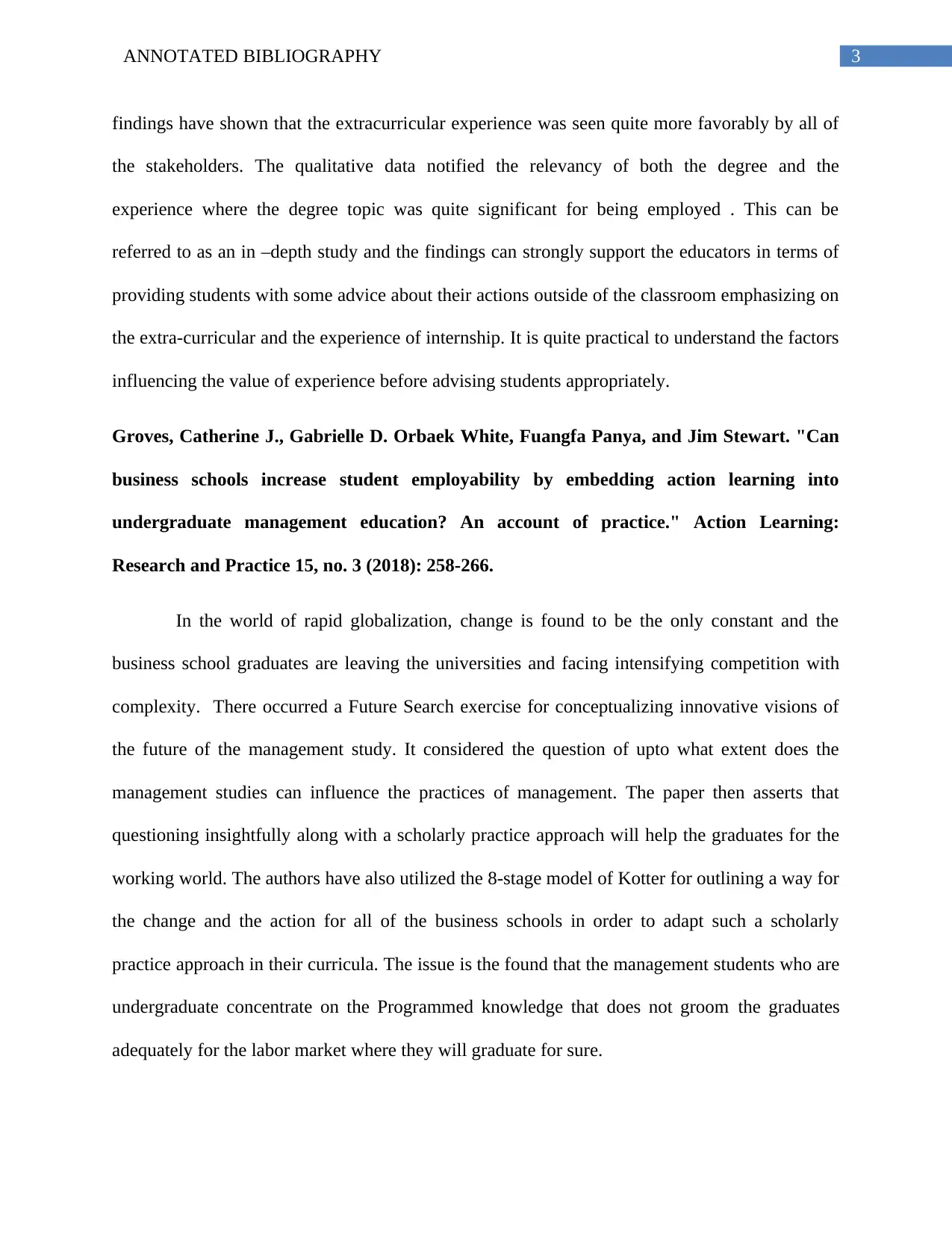
3ANNOTATED BIBLIOGRAPHY
findings have shown that the extracurricular experience was seen quite more favorably by all of
the stakeholders. The qualitative data notified the relevancy of both the degree and the
experience where the degree topic was quite significant for being employed . This can be
referred to as an in –depth study and the findings can strongly support the educators in terms of
providing students with some advice about their actions outside of the classroom emphasizing on
the extra-curricular and the experience of internship. It is quite practical to understand the factors
influencing the value of experience before advising students appropriately.
Groves, Catherine J., Gabrielle D. Orbaek White, Fuangfa Panya, and Jim Stewart. "Can
business schools increase student employability by embedding action learning into
undergraduate management education? An account of practice." Action Learning:
Research and Practice 15, no. 3 (2018): 258-266.
In the world of rapid globalization, change is found to be the only constant and the
business school graduates are leaving the universities and facing intensifying competition with
complexity. There occurred a Future Search exercise for conceptualizing innovative visions of
the future of the management study. It considered the question of upto what extent does the
management studies can influence the practices of management. The paper then asserts that
questioning insightfully along with a scholarly practice approach will help the graduates for the
working world. The authors have also utilized the 8-stage model of Kotter for outlining a way for
the change and the action for all of the business schools in order to adapt such a scholarly
practice approach in their curricula. The issue is the found that the management students who are
undergraduate concentrate on the Programmed knowledge that does not groom the graduates
adequately for the labor market where they will graduate for sure.
findings have shown that the extracurricular experience was seen quite more favorably by all of
the stakeholders. The qualitative data notified the relevancy of both the degree and the
experience where the degree topic was quite significant for being employed . This can be
referred to as an in –depth study and the findings can strongly support the educators in terms of
providing students with some advice about their actions outside of the classroom emphasizing on
the extra-curricular and the experience of internship. It is quite practical to understand the factors
influencing the value of experience before advising students appropriately.
Groves, Catherine J., Gabrielle D. Orbaek White, Fuangfa Panya, and Jim Stewart. "Can
business schools increase student employability by embedding action learning into
undergraduate management education? An account of practice." Action Learning:
Research and Practice 15, no. 3 (2018): 258-266.
In the world of rapid globalization, change is found to be the only constant and the
business school graduates are leaving the universities and facing intensifying competition with
complexity. There occurred a Future Search exercise for conceptualizing innovative visions of
the future of the management study. It considered the question of upto what extent does the
management studies can influence the practices of management. The paper then asserts that
questioning insightfully along with a scholarly practice approach will help the graduates for the
working world. The authors have also utilized the 8-stage model of Kotter for outlining a way for
the change and the action for all of the business schools in order to adapt such a scholarly
practice approach in their curricula. The issue is the found that the management students who are
undergraduate concentrate on the Programmed knowledge that does not groom the graduates
adequately for the labor market where they will graduate for sure.
Paraphrase This Document
Need a fresh take? Get an instant paraphrase of this document with our AI Paraphraser
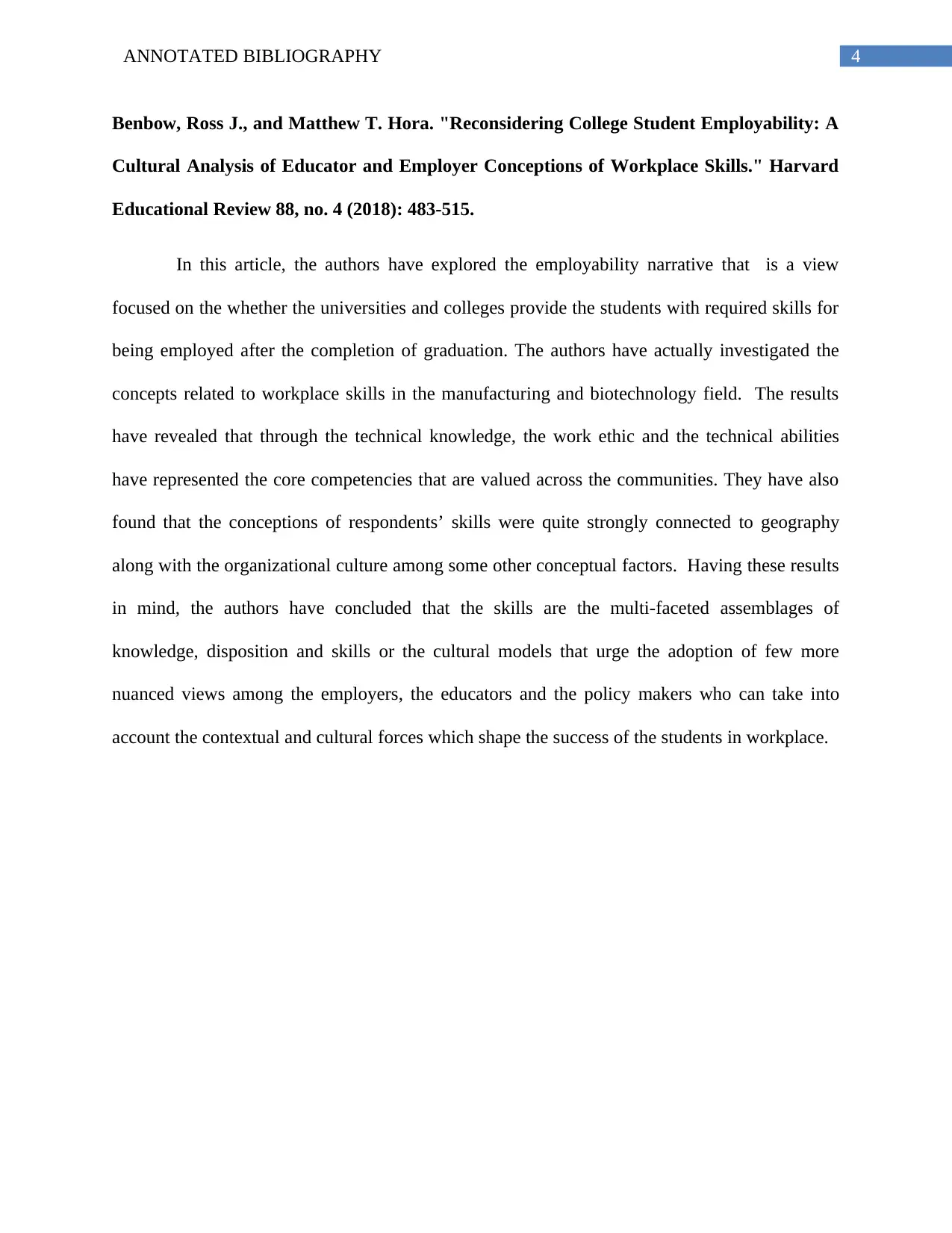
4ANNOTATED BIBLIOGRAPHY
Benbow, Ross J., and Matthew T. Hora. "Reconsidering College Student Employability: A
Cultural Analysis of Educator and Employer Conceptions of Workplace Skills." Harvard
Educational Review 88, no. 4 (2018): 483-515.
In this article, the authors have explored the employability narrative that is a view
focused on the whether the universities and colleges provide the students with required skills for
being employed after the completion of graduation. The authors have actually investigated the
concepts related to workplace skills in the manufacturing and biotechnology field. The results
have revealed that through the technical knowledge, the work ethic and the technical abilities
have represented the core competencies that are valued across the communities. They have also
found that the conceptions of respondents’ skills were quite strongly connected to geography
along with the organizational culture among some other conceptual factors. Having these results
in mind, the authors have concluded that the skills are the multi-faceted assemblages of
knowledge, disposition and skills or the cultural models that urge the adoption of few more
nuanced views among the employers, the educators and the policy makers who can take into
account the contextual and cultural forces which shape the success of the students in workplace.
Benbow, Ross J., and Matthew T. Hora. "Reconsidering College Student Employability: A
Cultural Analysis of Educator and Employer Conceptions of Workplace Skills." Harvard
Educational Review 88, no. 4 (2018): 483-515.
In this article, the authors have explored the employability narrative that is a view
focused on the whether the universities and colleges provide the students with required skills for
being employed after the completion of graduation. The authors have actually investigated the
concepts related to workplace skills in the manufacturing and biotechnology field. The results
have revealed that through the technical knowledge, the work ethic and the technical abilities
have represented the core competencies that are valued across the communities. They have also
found that the conceptions of respondents’ skills were quite strongly connected to geography
along with the organizational culture among some other conceptual factors. Having these results
in mind, the authors have concluded that the skills are the multi-faceted assemblages of
knowledge, disposition and skills or the cultural models that urge the adoption of few more
nuanced views among the employers, the educators and the policy makers who can take into
account the contextual and cultural forces which shape the success of the students in workplace.
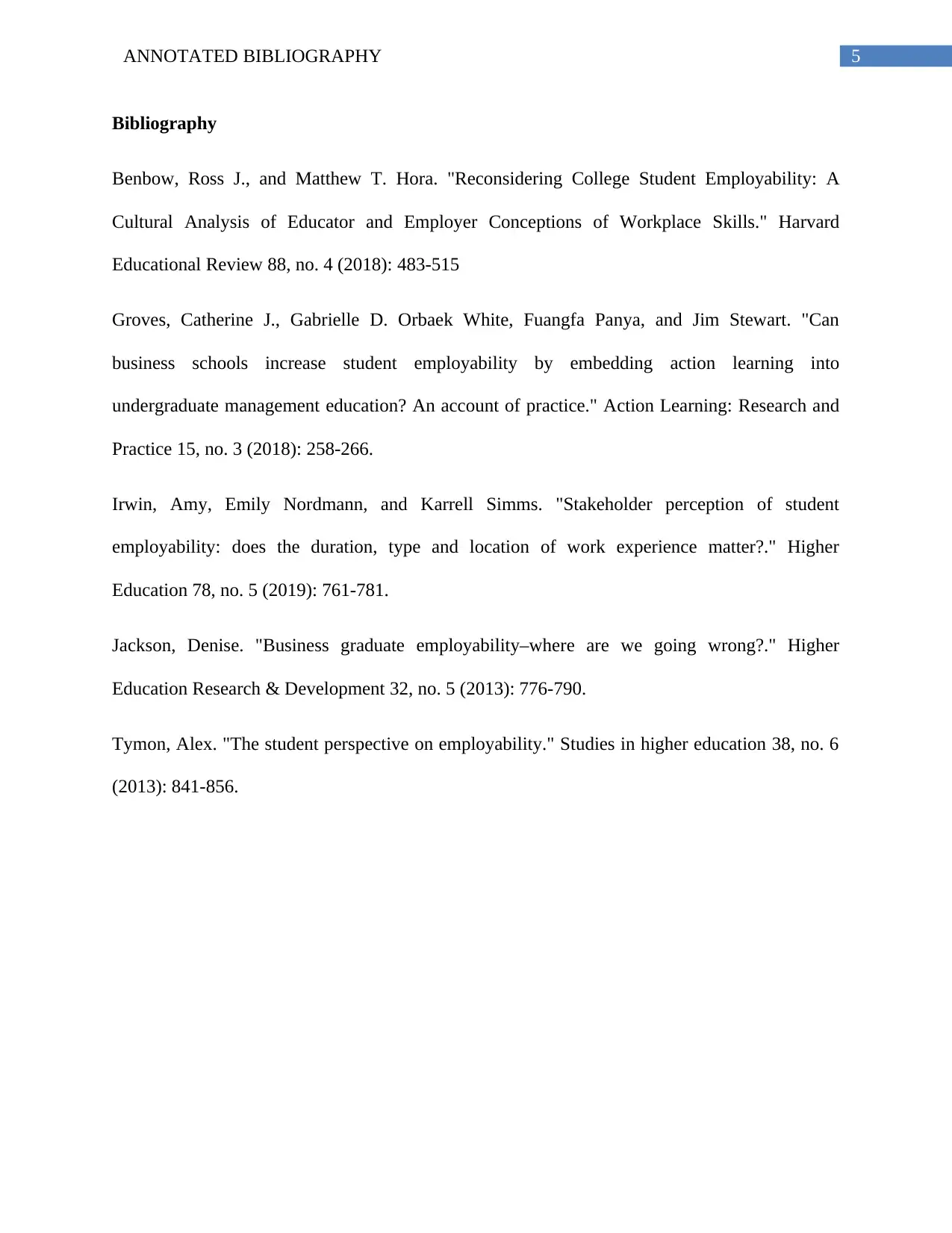
5ANNOTATED BIBLIOGRAPHY
Bibliography
Benbow, Ross J., and Matthew T. Hora. "Reconsidering College Student Employability: A
Cultural Analysis of Educator and Employer Conceptions of Workplace Skills." Harvard
Educational Review 88, no. 4 (2018): 483-515
Groves, Catherine J., Gabrielle D. Orbaek White, Fuangfa Panya, and Jim Stewart. "Can
business schools increase student employability by embedding action learning into
undergraduate management education? An account of practice." Action Learning: Research and
Practice 15, no. 3 (2018): 258-266.
Irwin, Amy, Emily Nordmann, and Karrell Simms. "Stakeholder perception of student
employability: does the duration, type and location of work experience matter?." Higher
Education 78, no. 5 (2019): 761-781.
Jackson, Denise. "Business graduate employability–where are we going wrong?." Higher
Education Research & Development 32, no. 5 (2013): 776-790.
Tymon, Alex. "The student perspective on employability." Studies in higher education 38, no. 6
(2013): 841-856.
Bibliography
Benbow, Ross J., and Matthew T. Hora. "Reconsidering College Student Employability: A
Cultural Analysis of Educator and Employer Conceptions of Workplace Skills." Harvard
Educational Review 88, no. 4 (2018): 483-515
Groves, Catherine J., Gabrielle D. Orbaek White, Fuangfa Panya, and Jim Stewart. "Can
business schools increase student employability by embedding action learning into
undergraduate management education? An account of practice." Action Learning: Research and
Practice 15, no. 3 (2018): 258-266.
Irwin, Amy, Emily Nordmann, and Karrell Simms. "Stakeholder perception of student
employability: does the duration, type and location of work experience matter?." Higher
Education 78, no. 5 (2019): 761-781.
Jackson, Denise. "Business graduate employability–where are we going wrong?." Higher
Education Research & Development 32, no. 5 (2013): 776-790.
Tymon, Alex. "The student perspective on employability." Studies in higher education 38, no. 6
(2013): 841-856.
⊘ This is a preview!⊘
Do you want full access?
Subscribe today to unlock all pages.

Trusted by 1+ million students worldwide
1 out of 6
Related Documents
Your All-in-One AI-Powered Toolkit for Academic Success.
+13062052269
info@desklib.com
Available 24*7 on WhatsApp / Email
![[object Object]](/_next/static/media/star-bottom.7253800d.svg)
Unlock your academic potential
Copyright © 2020–2026 A2Z Services. All Rights Reserved. Developed and managed by ZUCOL.





